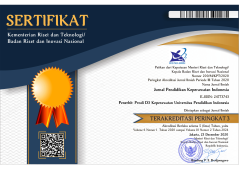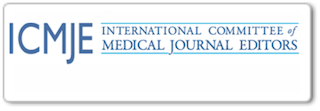The Analysis of Factors Related to Self Care of Men Who Have Sex with Men (MSM) with HIV/AIDS
Abstract
Men who have sex with men (MSM) contain the highest risk factor and contribute significantly to HIV / AIDS transmission. As a chronic disease, MSM with HIV / AIDS needs treatment and care for the rest of their lives. The complexity of HIV disease and its treatment makes self-care essential for the optimal health of people living with HIV. The Health Belief Model (HBM) factors can explain and predict self-care behavior in MSM with HIV/AIDS. This study aims to analyze the dominant factors associated with self-care of MSM with HIV / AIDS. This research uses quantitative methods with correlation analytic design. The sampling process employed a purposive sampling of 78 respondents. Primary data collection was processed by a self-care assessment questionnaire and HBM through google forms online survey. The data were analyzed using the Pearson product-moment correlation test and multiple linear regression. The results showed that the highest mean HBM was in perceived self-efficacy (23.18) and self-care in the spiritual domain (24.94). The bivariate results showed that self-care had a significant relationship with perceived susceptibility (r = 0.346, p <0.05), perceived benefits, (r = 0.255, p <0.05), and perceived self-efficacy (r = 0.406, p <0.05). The multivariate results found that perceived self-efficacy is the dominant factor (β = 0.406) which is related to the respondent’s self-care ability. Most respondents have the belief that they are capable of self-care, the higher the perceived self-efficacy the better the chance of having self-care. Services that respect and value MSM as humans by providing motivation through counseling during Voluntary Counseling and Testing (VCT) play a role in maintaining and increasing perceived self-efficacy. Nursing care that is carried out with the belief that everyone has the ability to care for themselves can help the individual meet the needs of life, maintain health and well-being.
Keywords
References
Boily, M. C., Baggaley, R. F., Wang, L., Masse, B., White, R. G., Hayes, R. J., & Alary, M. (2009). Heterosexual risk of HIV-1 infection per sexual act: systematic review and meta-analysis of observational studies. The Lancet Infectious Diseases, 9(2), 118–129.
Brown, M. J., & Serovich, J. M. (2015). Disclosure and Self-Efficacy Among HIV-Positive Men Who Have Sex with Men : A comparison Between Older and Younger Adults, 29(11), 625–633.
Buldeo, P., & Gilbert, L. (2015). Exploring the Health Belief Model and first-year students’ responses to HIV/AIDS and VCT at a South African university, 14(3), 209–218.
Chenard, C. (2007). The Impact of Stigma on the Self-Care Behaviors of HIV-Positive Gay Men Striving for Normalcy. Journal Of The Association Of Nurses In Aids Care, 18(3), 23–32.
Eller, L. S., Kirksey, K. M., Nicholas, P. K., Corless, I. B., Holzemer, W. L., Dean, J., … Sefcik, E. F. (2013). A randomized controlled trial of an HIV / AIDS Symptom Management Manual for depressive symptoms. AIDS Care, 25(4), 391–400.
Glanz, Karen, & Bishop, D. B. (2010). The role of behavioral science theory in development and implementation of public health interventions. Annual Review of Public Health, 31, 399–418.
Herlani, N., Riyanti, E., & Widjanarko, B. (2016). Gambaran Perilaku Seksual Berisiko HIV AIDS pada Pasangan Gay (Studi Kualitatif di Kota Semarang), 4, 1059–1067.
Houston, E., & Fominaya, A. W. (2015). Antiretroviral therapy adherence in a sample of men with low socioeconomic status : The role of task-specific treatment self-efficacy, Psychology, health & medicine, 20(8), 896-905.
Ibrahim, K., Emiliyawati, E., Rahayu, U., & Nuraini, A. (2013). Prediktor Kepatuhan Minum Obat Antiretroviral (ARV) pada Orang Hidung dengan HIV/AIDS (ODHA). Lapoaran Akhir Penelitian Perguruan Tinggi Universitas Padjajaran, 1(1), 1–47.
Jaenudin, U., & Tahrir, T. (2019). Studi Religiusitas, Budaya Sunda, dan Perilaku Moral pada Masyarakat Kabupaten Bandung. Jurnal Psikologi Islam Dan Budaya, 2(1), 1-8.
Jamil, M. S., Guy, R. J., Bavinton, B. R., Fairley, C. K., Grulich, A. E., Holt, M., … Kaldor, J. M. (2017). HIV testing self-efficacy is associated with higher HIV testing frequency and perceived likelihood to self-test among gay and bisexual men, Sexual health, 14(2), 170-178.
John, M. E., & Akpan, Samson; Etowa, J B; Akpabio; John, E. E. (2016). Enhancing self-care , adjustment and engagement through mobile phones in youth with HIV. International Council of Nurses, 63(4), 555–561.
Kelly, J. A., Hoffmann, R. G., Rompa, D., & Gray, M. (1998). Protease inhibitor combination therapies and perceptions of gay men regarding AIDS severity and the need to maintain safer sex, (April), 91–95.
Khumsaen, N., & Stephenson, R. (2017). Beliefs and perception about HIV / AIDS , self-efficacy, and HIV sexual risk behaviors among young Thai men who have sex with men, 29(2), 175–190.
Kraaij, V., Garnefski, N., Schroevers, M. J., Veek, S. M. C. Van Der, Witlox, R., & Maes, S. (2008). Cognitive coping , goal self-efficacy and personal growth in HIV-infected men who have sex with men, 72, 301–304.
Mahardining, A. B. (2010). Hubungan Antara Pengetahuan, Motivasi, dan Dukungan Keluarga dengan Kepatuhan Terapi ARV ODHA, 5(20), 131–137.
Mahmudah, N. (2018). Persepsi perempuan pekerja seks terhadap HIV-AIDS. Jurnal Kebidanan Dan Keperawatan Aisyiyah, 14(1), 69–74.
Mandayani, S., & Hidayat, H. (2019). Analisis Perilaku Pencegahan Penukaran HIV/AIDS Dengan Pendekatan Health Belief Model (HBM) Pada WBP Di LAPAS Kelas IIA PADANG. Jurnal Kesehatan, 7621(1), 33–43.
Mimiaga, M. J., Thomas, B., Mayer, K. H., Regenauer, K. S., Dange, A., Bedoya, C. A., … Safren, S. A. (2018). A randomized clinical efficacy trial of a psychosocial intervention to strengthen self-acceptance and reduce HIV risk for MSM in India : study protocol. BMC public health, 18(1), 1-7.
Pratama, P. A., & Sulistyarini, R. I. (2012). Dukungan Keluarga dan Depresi pada Penderita HIV/AIDS di Yogyakarta, 29–37.
Prawesti, N. A., Purwaningsih, P., & Armini, N. K. A. (2018). Faktor pendorong pemanfaatan layanan Voluntary Counselling and Testing (VCT) oleh lelaki suka dengan lelaki (LSL) di LSM gaya nusantara. Jurnal Ners Dan Kebidanan (Journal of Ners and Midwifery), 5(2), 129–136.
Siegel, K., & Schrimshaw, E. W. (2002). The Perceived Benefits of Religious and Spiritual Coping Among Older Adults Living with HIV/AIDS. Journal for the Scientific Study of Religion, 41(191–102).
Sirait, L. M., & Sarumpaet, S. (2013). Hubungan Komponen Health Belief Model (HBM) dengan Penggunaan Kondom Pada Anak Buah Kapal (ABK) Di Pelabuhan Belawan. Jurnal Precure, 1(April), 43–49.
Tebit, D. M., Ndembi, N., Weinberg, A., & Mateu, M. E. Q. (2012). Mucosal Transmission of Human Immunodeficiency Virus Denis. NIH Public Access, 10(1), 3–8.
Tucker, A., Liht, J., Swardt, G. De, Jobson, G., Rebe, K., & Mcintyre, J. (2014). Homophobic stigma , depression , self-efficacy and unprotected anal intercourse for peri-urban township men who have sex with men in Cape Town , South Africa : a cross-sectional association model, 26(7), 882-889.
WHO. (2009). Self-care in the Context of Primary Health Care. World Health Organization, (January), 7–9.
WHO. (2015). From MDGs to SDGs: General Introduction. Experimental Brain Research, 235(7), 2235–2242.
Xiao, Z., Li, X., Lin, D., Jiang, S., & Liu, Y. (2013). Sexual communication,safer sex self-efficacy, and condom use among young chinese migrants in beijing, China, 25(6), 480–494.
Yeo, T. E. D., & Fung, T. H. (2016). Between ‘ 0 ’ and ‘ 1 ’: safer sex and condom use among young gay men in Hong Kong. Culture, Health & Sexuality, 18(3), 294–307.
DOI: https://doi.org/10.17509/jpki.v7i1.33605
Refbacks
- There are currently no refbacks.
Jurnal Pendidikan Keperawatan Indonesia(JPKI) published by Indonesia University of Education. JPKI is licensed under a Creative Commons Attribution-ShareAlike 4.0 International License.
Office :
Nursing Department. FPOK UPI.
229, Dr. Setiabudhi Street. Bandung 40154
West Java , Indonesia
E-mail : jpki@upi.edu

_.png)
_.png)
_.png)











